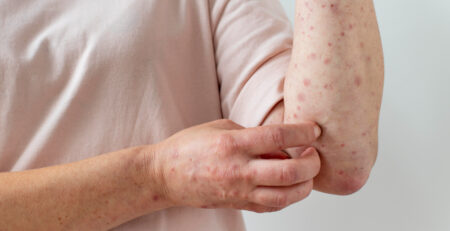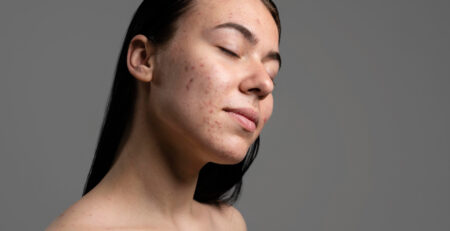The Connection Between Mental Health and Physical Health
Studies reveal that a change in one can cause a change in the other. As the amount of study on this topic grows, it is becoming obvious that mental health and physical health are closely linked. 1 But how do they really affect each other? How may a change in one part of the body cause a change in another part?
The Relationship Between Mental Health and Physical Health
To understand why mental and physical health are so connected, it’s crucial to remember that the differences between them aren’t as big as we might think. Thoughts, feelings, and our mental state may seem abstract or unrelated to our bodies, but they are all part of the way our brains work.
Changes in your mind and body that happen during your menstrual cycle are a fantastic example of how your brain and body are linked. More and more studies demonstrate that the changes in hormones that happen throughout a woman’s menstrual cycle affect a lot more than simply the reproductive system.
What Effects Does Physical Health Have on Mental Health?
Changes in dopamine, or the “happiness hormone,” which is linked to motivation and reward, have been shown to have a big effect on mental health. Oestrogen downregulates dopamine transmission. So, as your oestrogen levels go up, which happens before ovulation and before your period, your dopamine levels go down. This can make the symptoms of ADHD worse for some people. But that can make psychosis symptoms better for those with bipolar illness or other disorders that cause psychosis.
In the second half of your cycle, when your progesterone levels start to rise, so do your levels of allopregnanolone. Allopregnanolone is a neurosteroid that, in high doses, can help with depression, anxiety, and pain, but at low doses, it can make you more anxious, irritable, and have other bad mood symptoms. This weird effect is especially clear in the days before your period starts, when progesterone levels drop a lot. This is one reason why PMS causes mood fluctuations.
Not just reproductive hormones have been connected to mental health. Researchers have revealed that metabolic hormones, including insulin, cortisol, leptin, and others, can affect many different mental conditions, from ADHD to schizophrenia to eating disorders.
Research indicates that communication goes both ways. Stress-induced brain changes can be caused by metabolic diseases such as diabetes, high blood pressure, or even long periods of poor diet. These changes can lead to mood and neurodevelopmental abnormalities. In the same way, mood disorders and neurodevelopmental issues can create stress, which can cause changes in metabolism that, over time, can lead to the same metabolic diseases.
How Does Mental Health Affect Physical Health?
Several studies have indicated that mental illness may speed up biological ageing. This can lead to more heart disease, age-related disorders, and a life expectancy that is 10–20 years lower.
It’s crucial to note that these findings aren’t as simple as they sound. For example, being diagnosed with depression doesn’t necessarily mean you’ll live lessbeing diagnosed with depression doesn’t necessarily mean you’ll live less. The majority of these studies are based on epigenetic clocks, which use a process called DNA methylation to determine the age of a living thing.
But DNA methylation isn’t the only thing that makes us age. So it’s better to think of your epigenetic clock as a risk factor or predictor, like how someone with a genetic propensity for breast cancer is more likely to have cancer, but that doesn’t mean they will.
According to the findings, the psychological stress associated with many mental diseases may be linked to accelerated ageing in several ways:
- Stress can make people do things that are terrible for their health, like eat badly, not exercise, or take drugs.
- Stress can make it hard to sleep, which can hurt your health in the long run.
- Stress can cause cortisol levels to stay high for a long time, which can affect almost every part of the body, including the digestive system, immune system, cardiovascular system, and even the reproductive system.
This can put persons with mental illness at risk for a number of long-term diseases, such as:
- High blood pressure
- Heart disease
- Diabetes
- Stroke
- Insomnia
Tips for Maintaining Mental and Physical Health
The good thing about all the research on how mental and physical health affect each other is that it indicates that the body and brain are both quite open to change.
This ability to change is part of what made your mental and physical health problems get worse and worse over time. But because your body is so flexible, anything you do to take care of yourself will have the same capability to start a snowball effect of good changes. Here are some good locations to start.
Make Regular Exercise a Lifelong Habit
It’s impossible to say enough about how good exercise is for your body and mind. It improves muscle growth and performance, metabolic function, reduces inflammation, strengthens the immune system, improves the health of the heart, lungs, and blood vessels, and even helps improve the variety of gut microbiota.
All of these benefits to physical health will boost mental health because they are all linked. But exercise is also good for the brain in a direct way. Some of these benefits are better cognitive performance, better executive function, such as better working memory and impulse control, less despair and anxiety, and less stress.
Many of these benefits build up over time, so you’ll have to stick with a workout regimen for a few weeks before you notice a difference. But exercise may also provide some immediate benefits, such as making you feel better for a few hours, giving you more energy, and easing slight pain.
Follow these suggestions for the best short-term and long-term results:
- Don’t overdo it. Intense workouts can cancel out the benefits of exercise for your body and mind because they induce stress and put you in danger of getting hurt.
- Aim for 150–300 minutes of moderate aerobic activity per week, including at least two days of muscle-building activities.
- Choose something you really like to do. Exercise doesn’t have to be about doing your best or getting the most out of every workout. It just needs to be something that gets your body moving and maybe gives you a little bit of a challenge when you have the energy to give yourself a challenge. Hike, swim, dance, play with your dog, take a walk, or do anything else that will get you moving without making you feel like you’re working out.If you don’t know what you like, try something new every week until you find something you like.
- Start with goals that are too easy. Set daily goals that seem so easy that it would be silly not to execute them. This will keep you from giving up before exercise becomes a habit. Set the objective a bit higher each week.
Eat a healthy, balanced diet.
Diet is one of the most crucial things that can make you sick, but it can also be one of the hardest things to change about your life. So many different ideas about what you should and shouldn’t eat are out there. Plus, a lot of diet regimens encourage you to keep careful track of items like fibre, protein, and micronutrients. It’s way too much.
Instead of attempting to find the best diet plan or the latest “superfood” to consume, just follow a few fundamental rules of healthy nutrition and don’t worry about it:
- Drink more water. Most people should drink three to four litres of water per day.Don’t worry about how basic or acidic the water is. Any safe drinking water can hydrate you.
- Eat more fruits and vegetables. The five portions that are suggested add up to around 1.5 to 2 pounds per day. Any fresh food is healthy for you, so don’t think too much about it. Make sure that canned and frozen products don’t have a lot of added sugar or salt.
- Don’t eat too many processed foods. Even meals that haven’t been changed much, like bread or soup, might have a lot of salt and sugar in them. If you already have these options, check the label to see if there are low-sodium or low-sugar options.
If your behaviours aren’t perfect right now, don’t worry about perfecting them right away.Pick one change at a time to work on so that you can make it a habit for life.
Make time for doing nothing.
Many health tips, like the ones above, focus on things you need to do or modify. But it’s also crucial to remember that stress is a big reason why mental and physical health can hurt each other. So part of your recovery process should include making time to not stress about whether you’re eating the proper things, working out enough, or being busy enough.
Just sit down for a few minutes every day with no TV, phone, or other things to do and just be. Pay attention to where you are and how you feel right now. All done. Don’t think about what you have to do next or how you should feel or what you should be doing right now. Just a few minutes, or 40-45 minutes if you have the time.
People often call this “mindfulness,” but don’t let the name force you to make rules about what you should do or how to make the most of this time. The goal is to just check in with yourself and take a break from the noise of life for a while. Once you’ve made it a habit to take some time for yourself, you might try a more structured mindfulness activity if you want to.










Leave a Reply